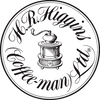Part of the story begins in 1938, about twelve months before the start of the second world war. My father was then the manager of a Coffee and Tea Specialist, in charge of its retail and wholesale business. Though he had many duties, he always spent time meeting customers in the shop. During this time, there were many refugees in London. He became aware of a man and a woman who were coming into the shop several times a week to buy half a pound of coffee (just under 250g in today's money). He discovered they were married and were living as refugees after fleeing from Germany. What they were doing was making a little money by selling their 8 oz. to other refugees. They, like so many refugees, were having a very hard time making a living.
In his diary he says on hearing their story, he gave them the companies best wholesale price for their purchases, so that when they sold the coffee they would have a better margin. Being of the very best quality, the coffee sold easily. Some time later the couple came back to my father with a proposition. They wanted to buy 18lb (around 8 Kilos) of coffee on credit, and to pay for it when they placed their next order. My father knew immediately that there was a problem - he couldn’t give them credit. His boss was very anti German refugees, especially if he thought they were Jewish. He would be in trouble if it was discovered he was giving them a discount as it was!
But although he couldn’t do what they wanted, he wanted to help. So instead, he bought the coffee with his own money. Then he said to them “Here is the coffee, take it as a gift, and when you come next week you can buy the next lot with your own money”. He says “I had no idea what that meant for them, and how it would help me later”. Never again did they ask for credit.
In the spring of 1942, my father achieved his life long ambition by starting his own business. But it was a desperate start. H.R.Higgins (Coffee-man) Wholesale Only, began in one room on the top floor of number 43 South Molton Street, with the most meagre equipment. In those dark days of the war, everything was in short supply. His customers were restaurants and shops with whom he continued his dream of creating a specialist coffee business.
He also became a coffee roaster for The Coffee Division of The Ministry of Food. The Ministry of Food became the importer of coffee into The United Kingdom at the outbreak of war. The Coffee Division was a coalition of coffee roasters who worked on government contracts. Many roasters were put out of action during the bombing and as a result, the contracts were constantly under threat. My father became one of their roasters. They sent in their coffee which my father roasted and packed.
His contact with the couple continued. He employed the lady as a sales representative on commission. She had access to the continental grocers and delicatessens, and they bought freely. The coffee they bought was my father’s Vienna Blend. He says there were times when she could sell more coffee than he could produce. Little did he realise when he made that small gesture years before what impact it would have.
Vienna Blend has featured in all our selections since that first list in 1946. I remember, many years later, taking a telephone call from a customer and finding to my amazement and delight I had the privilege of speaking with the world famous violinist and conductor Yehudi Menuhin. I think we had just made a new coffee list, with some new varieties. In conversation he told me that of all our coffees he had tried so far, the variety he enjoyed the most, was our Vienna Blend.
I send my very best wishes as we continue the journey through these difficult times.




